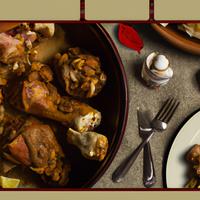
1 serving (100 grams) contains 0 calories, 0.0 grams of protein, 0.0 grams of fat, and 0.0 grams of carbohydrates.

Log this food in SnapCalorie

Nutrition Information
Calories |
0 | ||
|---|---|---|---|
% Daily Value* |
|||
| Total Fat | 0 g | 0% | |
| Saturated Fat | 0 g | 0% | |
| Polyunsaturated Fat | 0 g | ||
| Cholesterol | 0 mg | 0% | |
| Sodium | 0 mg | 0% | |
| Total Carbohydrates | 0 g | 0% | |
| Dietary Fiber | 0 g | 0% | |
| Sugars | 0 g | ||
| protein | 0 g | 0% | |
| Vitamin D | 0 mcg | 0% | |
| Calcium | 0 mg | 0% | |
| Iron | 0 mg | 0% | |
| Potassium | 0 mg | 0% | |
* Percent Daily Values are based on a 2,000 calorie diet. Your daily values may be higher or lower depending on your calorie needs.
Food Attributes
Source of Calories
About Chicken thigh bones
Chicken thigh bones are the sturdy, mineral-rich skeletal part found in chicken thighs. These bones are commonly used in culinary practices worldwide, particularly in broths, stews, and soups, as they impart deep flavor and richness to dishes. Known for their high calcium and phosphorus content, chicken thigh bones can contribute to bone health when used to create mineral-rich bone broth. Additionally, gelatin extracted from these bones during cooking provides collagen, which supports joint health and skin elasticity. While chicken thigh bones themselves are not consumed directly, they are integral to creating nutrient-dense meal bases in cuisines such as American Southern, Asian, and Mediterranean dishes. However, care should be taken not to ingest fragments of cooked bones, as they can splinter and pose a choking or digestive risk. Proper preparation ensures the benefits of flavor and nutrition while maintaining safety.



